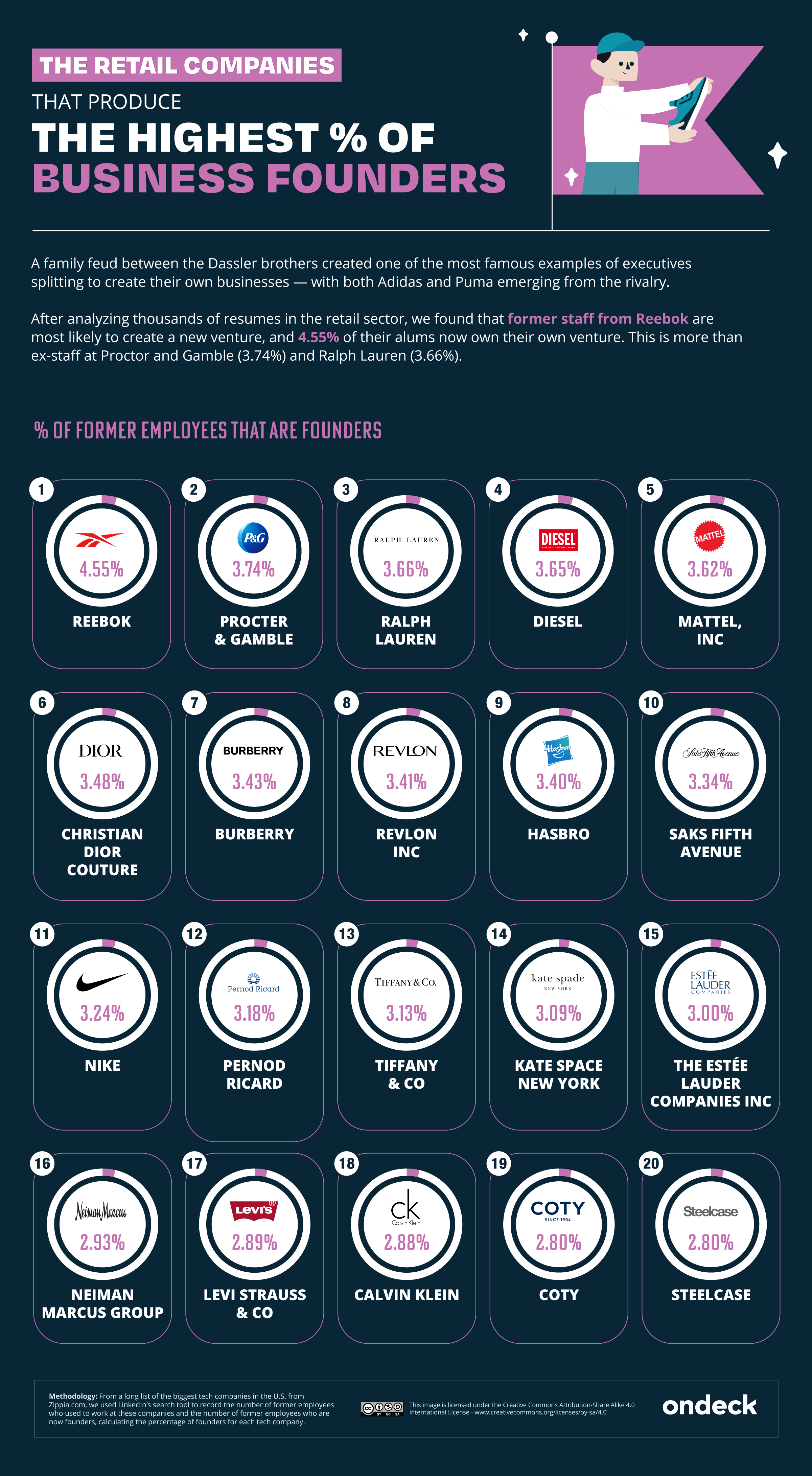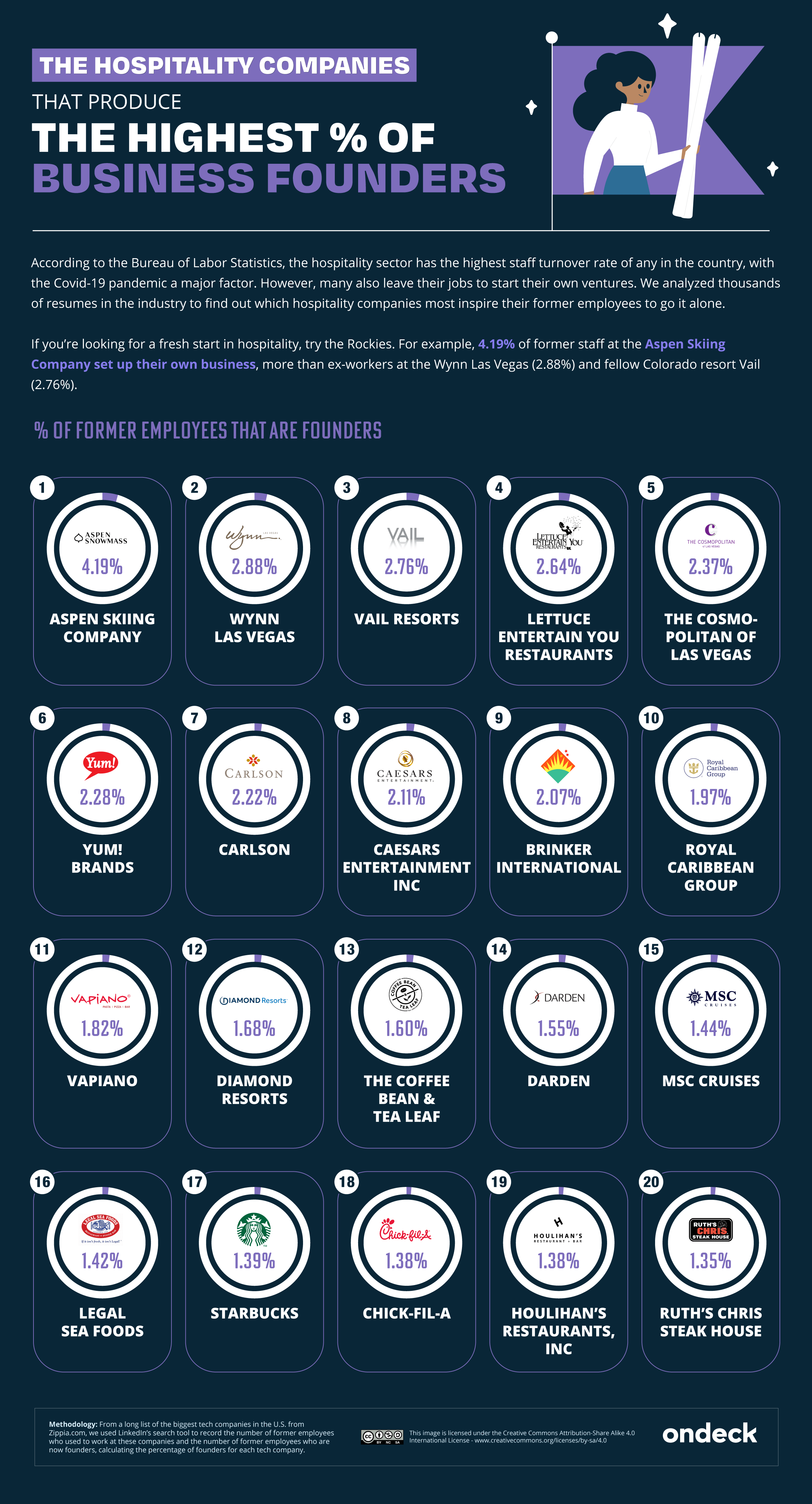Everyone has to start somewhere. It's just one of those rules of life. Even the most successful business owners and start-up tycoons had to get a 'real job' first.
And putting in some work before you start a business of your own is not a bad idea. Because as this latest study from OnDeck shows, certain companies have a history of producing the business leaders of the future.
Let's take a look at who those companies are.
But first, what does it really take to become a successful business founder?
Additionally, successful business founders often possess strong financial acumen, effective communication and negotiation skills, and the ability to take calculated risks.
Even if you've got the next big business idea sitting in the back of your brain, there are several things to consider before handing in your notice and flying solo.
Here are some important pieces of advice for leaving your job to start your business:
But, unfortunately, experience is something you can't buy or learn from a book (or from a few 'inspirational' Youtube tutorials!)
Instead, the only way to build up your experience is to...build up your experience. In other words, you need to dive down into the corporate trenches and get some hands-on experience.
For example, did you know that Jeff Bezos was an analyst on Wall Street before he started Amazon?
And Elon Musk worked at the energy storage company Pinnacle Research Institute prior to starting his first start-up during the dot-com bubble of the early 90s.
Then there’s Peter Thiel, founder of PayPal, Palantir, and Valar Ventures. His first job out of college was as a law clerk, followed by a stint as a derivatives trader at Credit Suisse.
Take Bain & Company, for example. More than 8% of the company's former staff are now running their own businesses.
They include the US billionaire, investor, and serial entrepreneur Steve Cook. After leaving Bain & Company, Cook co-founded financial software giant Intuit, which produced hugely popular products like Quickbooks. Inuit is now worth around $300million more than Bain & Company.
Here's a breakdown of how many of their employees went on to set up companies
Pompliano took that experience to launch Full Tilt Capital, an investment advisory firm specializing in digital assets. Full Tilt then became Morgan Creek Digital Assets, which now has over $1billion of assets under management.
It's not about where you are right now; it's about where you want to go in the future. And learning the ropes as a corporate exec can be the springboard to launch yourself toward start-up success.
Read next: Survey of almost 500 founders highlights the biggest factors that cause startups to fail
And putting in some work before you start a business of your own is not a bad idea. Because as this latest study from OnDeck shows, certain companies have a history of producing the business leaders of the future.
Let's take a look at who those companies are.
But first, what does it really take to become a successful business founder?
What does it take to become a successful business founder?
To be a successful business founder, you need to have a clear vision and plan for your business. You also need strong leadership skills, the ability to attract and retain talented team members, and a deep understanding of the industry and market in which you operate.Additionally, successful business founders often possess strong financial acumen, effective communication and negotiation skills, and the ability to take calculated risks.
Advice for aspiring business founders
Quitting a secure, well-paid position at a reputable firm to start a new business is a decision that you should never take lightly, no matter how talented or hard-working you are.Even if you've got the next big business idea sitting in the back of your brain, there are several things to consider before handing in your notice and flying solo.
Here are some important pieces of advice for leaving your job to start your business:
- Make sure you have a solid business plan before leaving your job.
- Build a support network, including mentors, advisors, and potential partners or investors.
- Save enough money to sustain yourself during the early stages of your business. Starting a business can be financially challenging, and having enough savings to cover your expenses while you work to get your business off the ground is important.
- Be prepared for long hours and hard work. Starting a business requires significant time and effort. You will be working harder and longer hours than you did at your previous job.
- Stay flexible and be prepared to adapt your business plan as needed.
- Be prepared for setbacks and failures. Be resilient and stay focused on your goal.
- Be prepared to learn as you go. Starting a business requires a lot of learning, and you will likely need to develop new skills and knowledge as you go along.
The value of experience
Experience is priceless. It's arguably one of the most important attributes any aspiring business owner needs.But, unfortunately, experience is something you can't buy or learn from a book (or from a few 'inspirational' Youtube tutorials!)
Instead, the only way to build up your experience is to...build up your experience. In other words, you need to dive down into the corporate trenches and get some hands-on experience.
Everyone starts somewhere
Paying your dues as an executive can set you up for long-term business success as a founder. Many of today's most famous (and super-successful) business founders started their careers by working for someone else.For example, did you know that Jeff Bezos was an analyst on Wall Street before he started Amazon?
And Elon Musk worked at the energy storage company Pinnacle Research Institute prior to starting his first start-up during the dot-com bubble of the early 90s.
Then there’s Peter Thiel, founder of PayPal, Palantir, and Valar Ventures. His first job out of college was as a law clerk, followed by a stint as a derivatives trader at Credit Suisse.
The companies that produce the most founders
The biggest and best companies in the world have a track record of breeding the entrepreneurs and business founders of the future, with many of their former employees going on to do amazing things.Take Bain & Company, for example. More than 8% of the company's former staff are now running their own businesses.
They include the US billionaire, investor, and serial entrepreneur Steve Cook. After leaving Bain & Company, Cook co-founded financial software giant Intuit, which produced hugely popular products like Quickbooks. Inuit is now worth around $300million more than Bain & Company.
Working in tech is a major stepping stone
Big tech and Silicon Valley are built upon innovation and the start-up spirit. So it makes sense that many business founders started their careers with positions at firms like Twitter, Meta, Google and Microsoft.Here's a breakdown of how many of their employees went on to set up companies
- Twitter: 6.7% of former staff are now business owners
- Google: 5.9% of former staff are now business owners
- Meta: 5.15% of former staff are now business owners
- Microsoft: 3.8% of former staff are now business owners
Pompliano took that experience to launch Full Tilt Capital, an investment advisory firm specializing in digital assets. Full Tilt then became Morgan Creek Digital Assets, which now has over $1billion of assets under management.
It's not about where you are right now; it's about where you want to go in the future. And learning the ropes as a corporate exec can be the springboard to launch yourself toward start-up success.
Read next: Survey of almost 500 founders highlights the biggest factors that cause startups to fail










